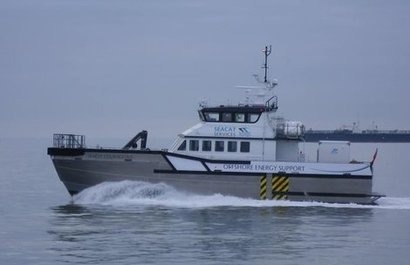
The vessel, Seacat Courageous, is a 26 metre high speed catamaran launched in February this year. It will be the first of the Seacat Services fleet to benefit from the ability to carry more than 12 persons on board who are not engaged in the operation of the vessel.
Many operators of smaller high-speed craft have, since the beginnings of the offshore wind crew transfer industry, been limited to carrying 12 or fewer persons, but this is now widely regarded to become insufficient when it comes to the manning of modern high-speed crew transfer vessels for use in both the offshore wind and oil and gas industries.
Although stringent safety standards has always remained a priority for vessel operators, current regulations do not acknowledge that the typical passenger of an offshore energy service vessel is a highly-skilled technician accustomed to working in the marine environment and with appropriate safety training. Furthermore, as offshore wind projects throughout Europe develop in size and complexity, the developers and operators of deep-water sites are increasingly demanding more versatile vessels with higher capacity for both equipment and personnel. The German flag state has now, in response to this, recently adopted a national guidance notice to allow vessels to operate with more than 12 industrial personnel onboard in national waters.
Seacat Services have provided a detailed “Gap Analysis” report between the IMO 2000 HSC Code and the existing vessel notation as a means of assisting the MCA and recognised classification organisations. With this information, coupled with the large amount of good work already being undertaken by the National Workboat Association and similar input from other vessel operators, designers and classification societies, the MCA should be able to satisfy itself and its neighbouring flag states that this type of vessel is safe to carry an increased number of personnel. In the light of this, Seacat Services has announced that Seacat Courageous will carry up to 24 offshore wind personnel.
The 26-metre catamaran, on display at this year’s Seawork exhibition, has a modular interior, which allows the client to specify the number of suspension seats between 0 and 24, dependant on the particular operational requirements of their project. This makes the vessel one of the most versatile available to the European offshore wind industry, building on its already impressive sea keeping and load bearing capacity.
“A change in regulations for UK-flagged workboats is something the industry has been desiring for some time – and now that they have this legislation in place elsewhere, in many ways it makes a great deal of sense for the MCA to follow suit, in order to attract vessels to the UK register” said Ian Baylis, Managing Director, Seacat Services. “While we’re unlikely to see a fundamental shift in the expectations of project owners and the way in which support vessels are operated in the coming years, modified legislation will remove a fairly arbitrary restriction on the capacity of vessels and allow a greater degree of flexibility – both for already operational boats such as Courageous and new builds entering the water.”
Mr Baylis added that, in short, not every project is going to require 24-seater vessels, but UK-based operators need to be well placed to meet growing demand, particularly with regard to the wider North Sea market where regulation changes are already in effect and benefitting overseas competitors.
Seacat Courageous is on show at the Seawork 2015 exhibition in Southampton this week, from 16-18 June, berth V27.
For additional information:

